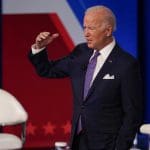BROKEN: Trust in mass media plummets to new low
Peter Daou writes: A candidate who wallows in bigotry, who incites violence, who verbally abuses his critics, who is a self-avowed threat to the free press, who trashes U.S. generals while praising Vladimir Putin, who demeans Gold Star families, gets less negative coverage than his opponent, a lifelong public servant who is one of the most accomplished and admired […]

A candidate who wallows in bigotry, who incites violence, who verbally abuses his critics, who is a self-avowed threat to the free press, who trashes U.S. generals while praising Vladimir Putin, who demeans Gold Star families, gets less negative coverage than his opponent, a lifelong public servant who is one of the most accomplished and admired women on the planet.
Perhaps “R.I.P. political journalism” is a premature title. There are certainly great reporters doing exceptional work at major publications. And independent journalists have carved out an important role in local and national reporting. Maybe things will turn around in the remaining weeks of the campaign. But there’s no doubt that the 2016 election cycle is a grim inflection point for the corporate media.
There’s no better example of this broken dynamic than a new poll on the public’s perception of Clinton’s honesty about her health.
It is a dynamic Peter and I have been detailing for quite some time: The corporate media create a narrative about Hillary Clinton; they repeat that narrative ad infinitum; they do a poll about that narrative; they report on the poll finding that the narrative has penetrated the public consciousness. Then they step away and summarily erase their role in creating the original narrative, retroactively justifying their creation of a false frame under the auspices of “this is what the public thinks,” as though “the public” came to that conclusion in a vacuum.
After days of cynical reporting on Clinton’s healthcare—including an enormous amount of commentary regarding her “lack of transparency,” as though failing to announce a temporary illness is somehow sinister—Politico blares the headline: “THE PUBLIC thinks Hillary Clinton has misled on her health.”
Capitalization original. THE PUBLIC thinks. As if that somehow absolves the media. Because THE PUBLIC thinks so.
Of course THE PUBLIC thinks Clinton has misled them—because the media has been telling THE PUBLIC she’s misled them for days. Look how brazen the process has become:
Good Wednesday morning. There are 55 days until Election Day and we have spent all week talking about whether Hillary Clinton’s health situation is affecting the race. So we partnered with our friends at Morning Consult to develop a poll to quickly capture public sentiment on the issue. Here’s what the wizards at Morning Consult found, polling 1,501 registered voters from Sept. 12-13: It’s a trust issue: 50% of people polled say Hillary Clinton has given the public false information about her health. Just 37% say the same about Donald Trump.
They’re not even trying to hide how it works. We spent all week talking about it; we hired a pollster; the pollster concluded that the frame we’ve spent all week pushing has registered with THE PUBLIC.
It’s become so routine that they don’t even have any compunction about it.
This is neither neutral nor objective. The media make value judgments about which stories to cover and how to cover them all the time. For example:
1. Is Hillary Clinton having pneumonia newsworthy?
2. If yes, how do we cover it? That is, do we make a straightforward report of the facts, or do we create or repurpose a frame into which we insert it?
3. If we create or repurpose a frame, what additional context, if any, do we need to provide for balance?
4. How much coverage do we dedicate to the story?
Here, the answers appear to have been: Yes; use existing false frame of “transparency”; provide very little to no balance by way of comparison with her opponents’ lack of transparency on medical records; and A LOT.
Those are not the only possible answers to those questions, though the media frequently pretend that they are.
There was no requirement—by any standard—that the media were obliged to cover this story in the way that they did nor as intensely as they did.
That was a choice. And it is a choice that gets made, over and over, in order to create the news and shape it in a very particular way. The subsequent polling is not a reliable indicator of public opinion about the issue in and of itself, but about the issue as framed and filtered through media with an agenda.
It doesn’t so much reflect what THE PUBLIC thinks about the news as much as it does how effective the media have been at shaping the news.
And that’s a real problem.
Judging from Gallup’s finding that trust in media has plummeted to a new low, perhaps they should reconsider so blatantly manipulating public opinion.
Recommended

Biden campaign launches new ad focused on Affordable Care Act
Former President Trump has said he wants to do away with the popular health care law.
By Kim Lyons, Pennsylvania Capital-Star - May 08, 2024
Trump leaves door open to banning medication abortion nationwide
Donald Trump is planning to release more details in the weeks ahead about how his administration would regulate access to medication abortion, according to comments he made during a lengthy interview with Time magazine published Tuesday.
By Jennifer Shutt, States Newsroom - April 30, 2024
Biden on abortion rights: President expects to give speech Tuesday on new Florida 6-week ban
‘Having the president of the United States speaking out loud and with confidence about abortion access is a great thing’
By Mitch Perry, Florida Phoenix - April 22, 2024












































































